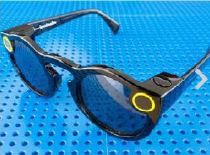The USPTO refused to register the proposed mark SPECTACLES for wearable computer hardware and peripherals, on the ground of genericness. Applicant Snap argued that its product does not correct vision, but is "a sophisticated digital camera with a battery and related software and hardware that allow users to upload pictures and short videos to the Snapchat photo/video sharing and social networking application." How do you think this appeal came out? In re Snap Inc., Serial Nos. 87177292 and 87211997 (November 3, 2021) [not precedential] (Opinion by Judge Michael B. Adlin).
The Board found the relevant public to be "vast, and practically coextensive with the consuming public at large, due to the ubiquity of computer hardware, software and peripherals in today’s society." The genus of the goods at issue was found to be "hardware and peripherals that are wearable as glasses."
Examining Attorney April Roach submitted dictionary definitions of "spectacles" that were "significant, consistent and persuasive − SPECTACLES means “glasses “eyeglasses” or “something resembling eyeglasses in shape or suggesting them in form.” Applicant Snap, in its briefs, referred to its goods as “smart glasses” or “camera glasses.”
The Board pooh-poohed Snap's argument that "spectacles" is merely an old fashioned term popular in the 18th Century. The evidence showed, however, that the media and applicant’s competitors currently use the term "spectacles" to refer to sophisticated high-tech products at the cutting edge of social media, information technology and consumer electronics.
And so, the Board affirmed the genericness refusal.
For the sake of completeness, the Board also considered applicant's claim that the proposed mark, assuming it is not generic, has acquired distinctiveness. The Board found the term SPECTACLES to be highly descriptive, and therefore, applicant’s burden to show acquired distinctiveness was “concomitantly high.”
Although the proposed mark has been in use for five years, that alone was not sufficient to establish acquired distinctiveness. The product enjoyed limited success in its early years. The probative value of the large number of media reports regarding the product was diminished because they appeared in niche publications. Even assuming some consumers were exposed to the mark, there was "no information about the overall extent of consumer exposure, or how consumer exposure to the SPECTACLES mark and product compares to consumer exposure to competitive marks or products."
Snap did not provide survey evidence, nor did it furnish sales and advertising figures, "often the most important evidence of acquired distinctiveness."
Moreover, Snap's use of the proposed mark was not “substantially exclusive” because third parties, including at least a few of applicant’s competitors, use "spactacles" in connection with their products.
And so, the Board concluded that, "[i]n short, the record does not support Applicant’s Section 2(f) claim."
Read comments and post your comment here.
TTABlogger comment: How about PINCE-NEZ instead of SPECTACLES?
Text Copyright John L. Welch 2021.
Labels:



0 comments:
Post a Comment